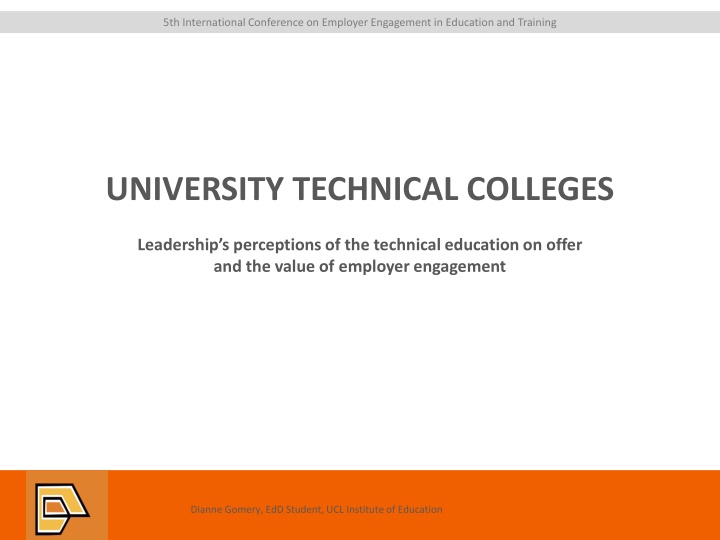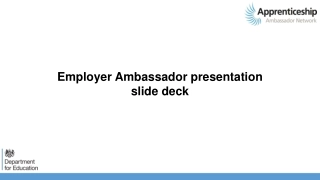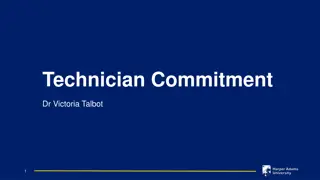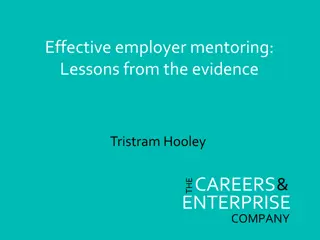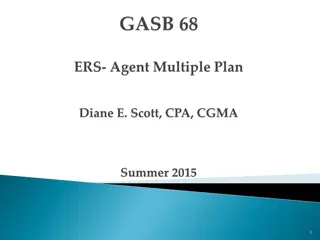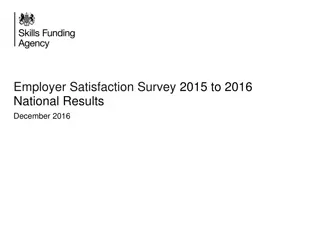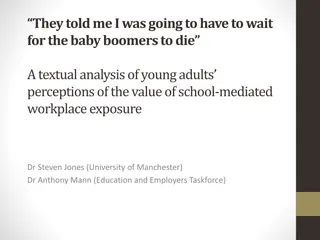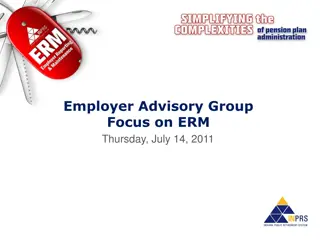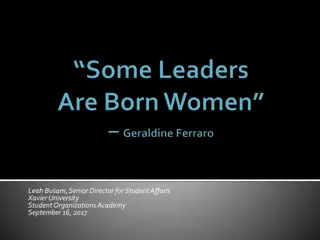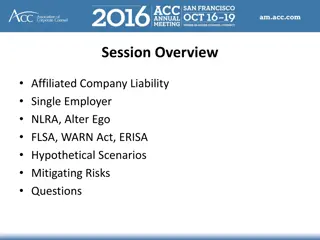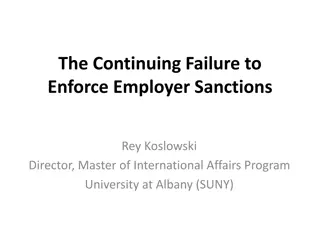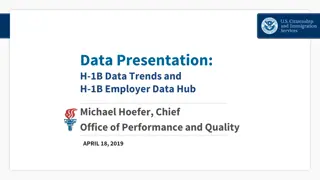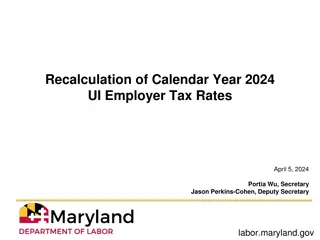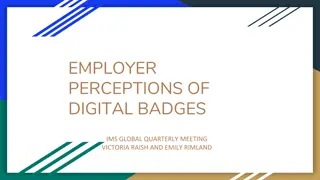Leadership Perceptions of Technical Education and Employer Engagement
The research explores school leaders' perspectives on technical education offerings and the significance of employer engagement. It delves into the implications of education reforms in England post-2010 and discusses issues such as student recruitment challenges and staff perceptions in UTCs. The study aims to shed light on the impact of diverse education agendas on school practices and outcomes.
Download Presentation

Please find below an Image/Link to download the presentation.
The content on the website is provided AS IS for your information and personal use only. It may not be sold, licensed, or shared on other websites without obtaining consent from the author.If you encounter any issues during the download, it is possible that the publisher has removed the file from their server.
You are allowed to download the files provided on this website for personal or commercial use, subject to the condition that they are used lawfully. All files are the property of their respective owners.
The content on the website is provided AS IS for your information and personal use only. It may not be sold, licensed, or shared on other websites without obtaining consent from the author.
E N D
Presentation Transcript
5th International Conference on Employer Engagement in Education and Training UNIVERSITY TECHNICAL COLLEGES Leadership s perceptions of the technical education on offer and the value of employer engagement Dianne Gomery, EdD Student, UCL Institute of Education
5th International Conference on Employer Engagement in Education and Training SILVERSTONE UTC Dianne Gomery, EdD Student, UCL Institute of Education
5th International Conference on Employer Engagement in Education and Training EDUCATION REFORM IN ENGLAND Successive governments education agendas, reforms and policies in England since 2010 have: Encouraged greater diversity in the market with the intention of increasing parental school choice options Stimulated the education market in terms of competition between providers that leads, ostensibly, to improved educational outcomes Championed collaboration and partnerships (to deliver school improvement) Dianne Gomery, EdD Student, UCL Institute of Education
5th International Conference on Employer Engagement in Education and Training SETTING THE SCENE 49 UTCs open in England (since 2010) 7 UTCs closed (since 2015) 500 average capacity per UTC Students aged 14 to 18 (entry points at age 14 and 16 years) Students entering the UTC at 14 have attended other provision for 3 years from the age of 11 Technical specialists in one or more subjects Industry standard state of the art equipment University and Employer Sponsors Supported by the Baker Dearing Educational Trust Dianne Gomery, EdD Student, UCL Institute of Education
5th International Conference on Employer Engagement in Education and Training READING UTC Dianne Gomery, EdD Student, UCL Institute of Education
5th International Conference on Employer Engagement in Education and Training EMERGENCE OF RESEARCH PROBLEM In earlier research participants raised concerns: Low student recruitment Overall school intake (gender balance, and prior academic attainment) Perceived dissonance between staff expectations versus practice Staff perception that the UTC was operating in a highly competitive environment Dianne Gomery, EdD Student, UCL Institute of Education
5th International Conference on Employer Engagement in Education and Training GREATER MANCHESTER UTC - seventh UTC to close (2017) Dianne Gomery, EdD Student, UCL Institute of Education
5th International Conference on Employer Engagement in Education and Training RESEARCH QUESTION How do UTC leaders perceive of and respond to competitive practices? What competitive pressure and practices have leaders perceived when leading UTC technical education in their lived market? What are the mediating factors leaders considered? What range of strategies did leaders adopt in response, and what were the outcomes for those leaders, their UTC and its students? Dianne Gomery, EdD Student, UCL Institute of Education
5th International Conference on Employer Engagement in Education and Training JABBAR S (2015) CONCEPTUAL FRAMEWORK ADAPTED TO REFLECT THE CONTEXT IN ENGLAND Dianne Gomery, EdD Student, UCL Institute of Education
5th International Conference on Employer Engagement in Education and Training ACHIEVED RESEARCH SAMPLE 10 Participants (identified as P1 to P10] across 9 UTCs Research undertaken spring/summer 2017 Purposive sampling of 9 UTCs regionally spread across England 10 Purposively sampled UTC Leaders (approximately 20% of total cohort) 9 Principals and one Deputy Principal 6 leaders in post (5 Principals and one Deputy Principal) 4 former Principals Dianne Gomery, EdD Student, UCL Institute of Education
5th International Conference on Employer Engagement in Education and Training UTCs BECOMING PART OF THE EDUCATIONAL LANDSCAPE Initially, the thinking was it would be a big push for maybe the first couple of years, but then it [UTCs] would become part of the educational landscape (P5) Dianne Gomery, EdD Student, UCL Institute of Education
5th International Conference on Employer Engagement in Education and Training LEADERS PERCEPTIONS UTC MODEL This idea that you could have a very strong vocational pathway, which wasn t second class, which could lead on to university, and would have as much value as any other pathway. That was the strength (P5) I think that at the time it did feel like there was a policy impetusto provide greater value to vocational and technical education, which has been missing in our education system for a long time, which was what attracted me to the idea of UTCs (P8) Well, it s about being something different, and I think it s about being another pathway. We re not another school, and I ve always said to people when they come to this building to look around it, When you come here, we re like marmite. You either love us or you hate us (P9) Dianne Gomery, EdD Student, UCL Institute of Education
5th International Conference on Employer Engagement in Education and Training WHAT DRIVES LEADERS? So all of those elements, writing the bid, which, if you re passionate about it, it comes from the heart (P7) At the end of the day, I came into this because I passionately believe in UTCs, and I passionately believe what they re about. I passionately believe in the UTC model, so yes, that s what we do (P8) When you look at the value we added in their lives, it was brilliant, and the happiness that they got out of their time with us, and how much they grew as people, it s a great model (P5) Dianne Gomery, EdD Student, UCL Institute of Education
5th International Conference on Employer Engagement in Education and Training EMPLOYER ENGAGEMENT unique selling proposition Our USP now is with employer engagement, and that s our real USP, the employers we work with, the destinations the students go to, how successful our students have been, where they go and work, and what they do. That really is the bit that sings out, and the parents, we ve found, that have come here have looked for that, actively (P8) Our employers are now guaranteeing that if someone applies for a job with them having completed the course here, they will guarantee them an interview, because again it shows those links, and the fact that we re turning out those rounded people with the employability skillsthey re looking for (P1) Dianne Gomery, EdD Student, UCL Institute of Education
5th International Conference on Employer Engagement in Education and Training EMPLOYER ENGAGEMENT establishing relationships The first thing is talk to employers who are the sponsors for the UTC, and find out what they wanted from it, and then try and marry that to the requirements of Progress 8, national curriculum (P1) Employers, they [students] like to see them, and they like the work experience, that added value, and they got to do that every year for four years, so that was very different to their schools. Their parents appreciated that (P3) So we ve got to work with them to collaborate on how we can deliver what they want as employers, but to the level of students, the abilities we ve got, and our capacity to deliver that. That s an going piece of work (P4) Dianne Gomery, EdD Student, UCL Institute of Education
5th International Conference on Employer Engagement in Education and Training EMPLOYER ENGAGEMENT in practice We use a lot of business mentors. We spend an awful lot of time, whether it s through assemblies, through visits, through work experience programmes, through exposure to companies-, it s all about, for us, letting students think for themselves about destinations (P9) We did absolutely fantastic things with the employers, and I stand by that (P6) We ve got state of the art workshops. They see great things, and they come, and employers are here doing lots of activities with them, so yes, they come and see something very different to what they see in school. I think partly the facility is the attraction. I think though for parents it s the destinations that are the attractions, and actually for the students as well (P8) Dianne Gomery, EdD Student, UCL Institute of Education
5th International Conference on Employer Engagement in Education and Training EMPLOYER ENGAGEMENT in practice What we were about was engaging employers. Great, do it, but then if you fail your GCSEs, you re going to get shut down. So you ve got to have that balance, and that took away from some of the exciting things that we could ve done (P3) The opportunities to work with employers and get employers in, and the projects we did with employers, like XXXX, big companies who are giving up huge swathes of time really to work with the learners on doing projects (P8) That profiling is through our unique education, working with employers and businesses, and hosting events to which people get invited and wish to come that aren t necessarily related to recruitment but are related to the profile of the UTC, and what it delivers (P9) Dianne Gomery, EdD Student, UCL Institute of Education
5th International Conference on Employer Engagement in Education and Training EMPLOYER ENGAGEMENT balance and changing perceptions It s trying to get the balance, that you re meeting the ethos of what the trustees wanted, but also doing right by their learners, so you re not disadvantaging the learners by putting them on to too narrow a curriculum (P1) My generation twenty years ago had a perception of what an apprenticeship was, and that s what you did if didn t go off to university, didn t do something academic. You went and did an apprenticeship, and it was something, and something practical. We just need to break that perception a little, and certainly some of the university and degree-level apprenticeships that we re working with the University on now may, in the long-term, change people s understanding and perception of what apprenticeships are (P2) Dianne Gomery, EdD Student, UCL Institute of Education
5th International Conference on Employer Engagement in Education and Training EMPLOYER ENGAGEMENT skills development We ve got X number of skills that the employers have told us we need to deliver. I m sure they are fairly generic and it s the way we deliver those projects through project work, work experience and employers coming in to give master class whatever that is that s what they are most interested in (P2) The employers actually were better than the University. The University plugged gaps, but the employers were the main thing. The employers actually designed the projects so they were very significant, and a lot of practical work (P6) Dianne Gomery, EdD Student, UCL Institute of Education
5th International Conference on Employer Engagement in Education and Training RESEARCH FINDINGS Competition and competitive practices Difficulty building relationships - between UTC Principals and local education providers High levels of competition - to either gain, retain, or lose students Restricted access to students Low status in the local hierarchy of schools Academic performance of students National inspection grade Pressures Recruitment students Financial funding and constraints Marketing considerable input and cost Dianne Gomery, EdD Student, UCL Institute of Education
5th International Conference on Employer Engagement in Education and Training RESEARCH FINDINGS: MEDIATING FACTORS SCHOOL HIERARCHIES Leaders were cognisant of their place within the local hierarchy of schools and of local schools perceptions of the UTC and found it difficult or impossible to mediate those perceptions NATIONAL ACCOUNTABILITY MEASURES Leaders aware of the importance of students academic performance as a non- negotiable mediating factor that informed their strategic responses to competition and competitive practices Dianne Gomery, EdD Student, UCL Institute of Education
5th International Conference on Employer Engagement in Education and Training LEADERS PERCEPTIONS UTC leaders believe that their peers (leaders of local provision) do not perceive them as legitimate partners (Habermas,2015) UTC leaders may not be perceived as partners because they do not share all of their peers values, beliefs, practices and procedures (Thornhill, 2011) and/or may be perceived as competitors Perceived as being not an equal partner and competitor leaders found it difficult to negotiate ways of working that were acceptable to their peers spheres of influence Leaders lack of status impacted on their self-image and self-worth as education professionals Dianne Gomery, EdD Student, UCL Institute of Education
5th International Conference on Employer Engagement in Education and Training SIGNIFICANCE OF FINDINGS Leaders belief in the UTC provision Perceptions of UTCs and technical education at local and national levels Type and range of relationships developed with all stakeholders Hierarchical structure and aspirations for the area Geographical placement and local hierarchy of schools Dianne Gomery, EdD Student, UCL Institute of Education
5th International Conference on Employer Engagement in Education and Training LIMITATIONS OF THE RESEARCH Achieved sample was small and purposively sampled and may therefore not represent those of a different group chosen from across the total number UTCs Leaders perceived their lived market at different times during their tenure and possibly during a period of considerable qualification reform Leaders had varied prior experience within secondary education and therefore their perceptions could be influenced by the range of that prior experience Dianne Gomery, EdD Student, UCL Institute of Education
5th International Conference on Employer Engagement in Education and Training ISSUES How do we evaluate this changing dynamic of new provision? How can connections between new provision and existing provision be mediated and by whom? School hierarchies, academic performance, and the role of trust how these are built within a system that has multiple voices and degrees of historical and present power within the lived market? Dianne Gomery, EdD Student, UCL Institute of Education
5th International Conference on Employer Engagement in Education and Training THE FUTURE What we need really are our industry leaders standing up and saying, You know what? UTCs seem to have the model that we want. If we could develop more of those, then we could have more of an input. We understand you need your core academic subjects, but actually this is the right direction to go (P9) If England is to have a world-class system (Queen s Speech, 2017) these findings suggest: Technical education is celebrated as being different from and of equal value to academic study Technical education is a pathway embedded within the educational system Dianne Gomery, EdD Student, UCL Institute of Education
